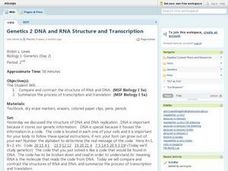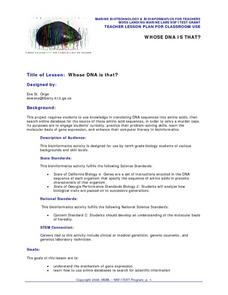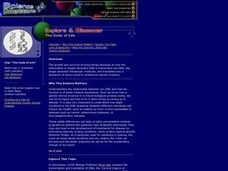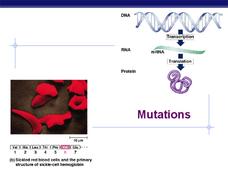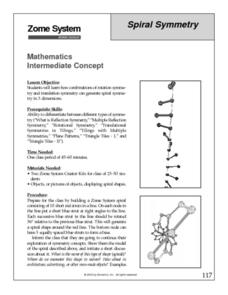Curated OER
Genetic Challenge Worksheet
In this genetics worksheet, students describe how to tell the difference between DNA, RNA, and proteins. Students also learn about the processes of transcription and translation. This worksheet has 3 short answer and 3 fill in the blank...
Curated OER
RNA and Gene Expression
In this RNA and gene expression worksheet, learners match the letter of the description that best matches the term as it relates to gene expression. Students also answer questions as it relates to the process of transcription and...
Curated OER
Constructing a Protein Sentence
Fourth graders, in pairs, examine how every cell contains a 'blueprint' coded in DNA molecules. They use a DNA template to determine the m-RNA and t-RNA sequences for protein.
Curated OER
Anticodons And Amino Acids Game
Students examine the process of protein synthesis. In small groups, they select an index card, and translate the DNA to an amino acid, and define the words on an anticodon/amino acid chart.
Curated OER
How Genes Work Lesson Plan
Students define the key terms that are the structure and function of DNA. In this genetics lesson plan students complete a lab activity in which they construct a model DNA structure.
Curated OER
DNA and RNA Structure and Transcription
Students compare and contrast the structure of RNA and DNA.They summarize the process of transcription and translation. The instructional activity uses an inquiry model and the use of codes in DNA.
Curated OER
Condon Bingo
Students use COndon Bingo to decipher genetic codes. Students practice transcription and translation of codons while playing the game. They enjoy playing the game, while actively participating. Students develop an increase proficiency...
Curated OER
Protein Synthesis Worksheet
In this protein synthesis worksheet, students complete 17 questions about making proteins through the process of transcription and translation. They use a sample of DNA to make a protein using a given tRNA dictionary.
Curated OER
Translating Genetic Information
Students explore the process of translation. They determine the correct sequencing and present their strands to the class. In addition, they compare normal red blood cells to sickle cells and complete discussion questions.
Curated OER
Transcription, Translation, and the Genetics of Microbes
Students construct various virus models using Fruit loops and Alphabits to represent nucleotides and molecules. They constructs capsomeres using shoes as the capsomeres and discuss various viruses.
Curated OER
Whose DNA Is That?
Students investigate the use of technology in order to identify different sequences of amino acids by using online web tools. They enhance problem solving skills with amino acid identification skills and strengthening comfort with using...
Curated OER
Genetics
In this worksheet, students will answer 4 fill in the blank statements about Mendelian inheritance and meiosis. Then students will use Punnett squares to answer three short answer questions. Students will match 8 genetics vocabulary...
Serendip
Genetic Engineering Challenge – How Can Scientists Develop a Type of Rice That Could Prevent Vitamin A Deficiency?
Brown rice contains vitamins B and E, while white rice lasts longer in storage. The availability of rice around the world makes it a great candidate for genetic engineering. Scholars apply their knowledge of genetic engineering to solve...
Curated OER
Who Stole My Salad?
Eighth graders explain how protein is made in the cell. In this biology lesson, 8th graders translate RNA and DNA using an internet database. They determine the thief based on evidence collected.
Curated OER
The Code of Life
Students study genes, DNA and medical research. They watch "The Code of Life" video and answer discussion questions regarding the transcription and translation of DNA and how errors in these processes and mutations in DNA can produce...
Curated OER
Genetics and Molecular Biology
Students create DNA models using colored construction papers. For this biology lesson, students identify enzyme restriction sites. They model how DNA plasmids replicate when taken up by a bacterial cell.
Curated OER
Protein Factory
Learners examine protein synthesis and how DNA is transcribed. For this investigative lesson students play a role in the messenger RNA when it creates nucleotides.
Curated OER
"Chips" Off the Old Block?
Students study using analogies between common items or occurrences and science concepts. They use the analogy of cookie recipes to that of the DNA "recipes" for living things to help us explain more about mutations.
Howard Hughes Medical Institute
Molecular Genetics of Color Mutations in Rock Pocket Mice
Can you identify mutations just by viewing DNA sequences? Scholars apply prior knowledge of DNA sequences to do just that in an engaging activity. They transcribe and translate genes, thus identifying the locations of mutations. Then,...
Curated OER
Mutations
The basics of mutation types and some potential effects of those are described and diagrammed here. Each detail is very clear and includes the labels and translation change exhibited. A great slideshow to expand on DNA replication issues.
Curated OER
Genetics
An interesting PowerPoint which provides the main facts, definitions, and terminology necessary for understanding DNA. It also presents summaries of the processes involved with DNA replication and the application of protein isolation and...
Curated OER
Spiral Symmetry
Taking the notion of symmetry to the next level, this looks at combining rotation and translation symmetry to build spiral symmetry in three dimensions. Using the Zome modeling system and an instructor’s guidance, geometers try to build...
Curated OER
Protein Factory
Students discuss the steps of protein synthesis before acting out the process as a class. They are assigned specific roles and receive an instruction card and get materials listed in order to perform their role. Students switch roles...
Curated OER
Protein Synthesis
In this science related worksheet, students study, locate and answer ten multiple choice questions dealing with protein synthesis.







